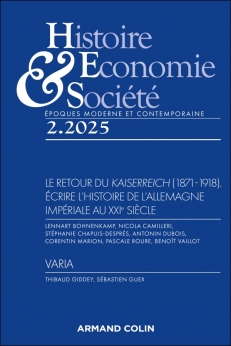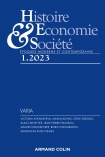
HISTOIRE, ÉCONOMIE ET SOCIÉTÉ (2/2025)
Pour acheter ce numéro, contactez-nous
Recevez les numéros de l'année en cours et accédez à l'intégralité des articles en ligne.
Cet article revient sur les paradigmes, débats et évolutions de l’historiographie portant sur l’Empire allemand (1871-1918), principalement de langue allemande,mais aussi française et anglaise, depuis le lendemain de la Seconde Guerre mondiale. Il montre ainsi la place centrale qu’a occupée le Kaiserreich durant les huit dernières décennies, dans la recherche historique, mais aussi plus généralement politiquement pour l’Allemagne d’après le nazisme. Le cent-cinquantenaire de la proclamation de l’Empire en 2021 a conduit à remettre l’Allemagne impériale, son système politique, ses valeurs et sa société sur le devant de la scène historiographique – dans un contexte d’éclatement thématique de la recherche sur le sujet – et médiatique – à un moment où débats mémoriels et politiques, notamment sur le degré de démocratisation de l’Empire, battent leur plein.
This article reviews the historiographical paradigms, debates and developments on the German Empire (1871-1918) since the aftermath of the Second World War, mainly in the German but also in the French and English-speaking literatures. It shows the central place that the Kaiserreich has played over the last eight decades, not only in historical research, but also more generally politically for post-Nazi Germany. The 150th anniversary of the proclamation of the Empire in 2021 has brought imperial Germany, its political system, its values and its society back to the forefront of the historiography – in the context of a thematic fragmentation of the research on the subject – and the media – at a time of strong memorial and political debates, notably on the degree of democratization of the Empire.

